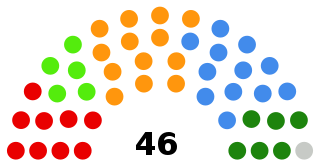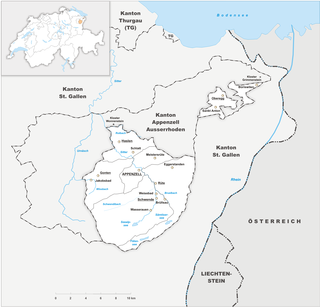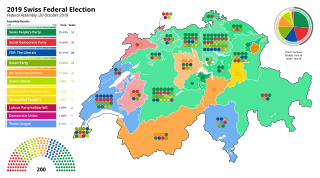
Federal elections were held in Switzerland between 1 and 27 October 1848. The Radical Left emerged as the largest group, winning 79 of the 111 seats in the National Council. [1]
| This article is part of a series on the |
 |
|---|

Federal elections were held in Switzerland between 1 and 27 October 1848. The Radical Left emerged as the largest group, winning 79 of the 111 seats in the National Council. [1]
The 111 members of the National Council were elected from 52 single- and multi-member constituencies. In six cantons (Appenzell Innerrhoden, Appenzell Ausserrhoden, Glarus, Nidwalden, Obwalden and Uri), National Council members were elected by the Landsgemeinde.
 | ||||
|---|---|---|---|---|
| Party | Votes | % | Seats | |
| Radical Left | 58.0 | 79 | ||
| Liberal Centre | 16.9 | 11 | ||
| Catholic Right | 11.6 | 10 | ||
| Evangelical Right | 8.6 | 5 | ||
| Democratic Left | 4.3 | 6 | ||
| Total | 111 | |||
| Total votes | 228,877 | – | ||
| Registered voters/turnout | 512,691 | 44.64 | ||
| Source: BFS | ||||
| Constituency | Seats | Party | Seats won | Elected members | |
|---|---|---|---|---|---|
| Aargau | 9 | Radical Left | 8 |
| |
| Liberal Centre | 1 | Jakob Isler | |||
| Appenzell Ausserrhoden | 2 | Radical Left | 2 |
| |
| Appenzell Innerrhoden | 1 | Catholic Right | 1 | Johann Nepomuk Hautle | |
| Basel-Landschaft | 2 | Radical Left | 1 | Johann Jakob Matt | |
| Democratic Left | 1 | Emil Remigius Frey | |||
| Basel-Stadt | 1 | Liberal Centre | 1 | Achilles Bischoff | |
| Bern 5 | 4 | Radical Left | 4 |
| |
| Bern 6 | 4 | Evangelical Right | 2 |
| |
| Radical Left | 2 |
| |||
| Bern 7 | 3 | Radical Left | 2 |
| |
| Liberal Centre | 1 | Johann Schneider | |||
| Bern 8 | 3 | Radical Left | 3 |
| |
| Bern 9 | 3 | Liberal Centre | 1 | Karl Neuhaus | |
| Radical Left | 1 | Jakob Stämpfli | |||
| Evangelical Right | 1 | Guillaume-Henri Dufour | |||
| Bern 10 | 3 | Radical Left | 2 |
| |
| Liberal Centre | 1 | Xavier Péquignot | |||
| Fribourg 1 | 1 | Radical Left | 1 | Jacques-Joseph Remy | |
| Fribourg 2 | 1 | Radical Left | 1 | Nicolas Glasson | |
| Fribourg 3 | 1 | Radical Left | 1 | Christophe Joachim Marro | |
| Fribourg 4 | 1 | Radical Left | 1 | Jean Folly | |
| Fribourg 5 | 1 | Liberal Centre | 1 | François-Xavier Badoud | |
| Geneva | 3 | Radical Left | 3 |
| |
| Glarus | 1 | Radical Left | 1 | Caspar Jenny | |
| Grisons 1 | 1 | Evangelical Right | 1 | Johann Baptista Bavier | |
| Grisons 2 | 1 | Radical Left | 1 | Alois de Latour | |
| Grisons 3 | 1 | Radical Left | 2 | Georg Michel | |
| Grisons 4 | 1 | Liberal Centre | 1 | Andreas Rudolf von Planta | |
| Lucerne | 6 | Radical Left | 4 |
| |
| Catholic Right | 1 | Philipp Anton von Segesser | |||
| Liberal Centre | 1 | Jakob Kopp | |||
| Neuchâtel | 3 | Radical Left | 3 |
| |
| Nidwalden | 1 | Catholic Right | 1 | Melchior Wyrsch | |
| Obwalden | 1 | Catholic Right | 1 | Franz Wirz | |
| Schaffhausen | 2 | Radical Left | 2 |
| |
| Schwyz-North | 1 | Catholic Right | 1 | Johann A. Steinegger | |
| Schwyz-South | 1 | Liberal Centre | 1 | Franz Karl Schuler | |
| Solothurn | 3 | Radical Left | 3 |
| |
| St. Gallen 1 | 2 | Radical Left | 2 |
| |
| St. Gallen 2 | 2 | Radical Left | 2 |
| |
| St. Gallen 3 | 2 | Radical Left | 1 | Dominik Gmür | |
| Liberal Centre | 1 | Johann Jakob Steger | |||
| St. Gallen 4 | 2 | Radical Left | 1 | Johann M. Hungerbühler | |
| Liberal Centre | 1 | Johann Georg Anderegg | |||
| Thurgau 1 | 1 | Radical Left | 1 | Johann Georg Kreis | |
| Thurgau 2 | 1 | Radical Left | 1 | Johann Konrad Kern | |
| Thurgau 3 | 1 | Democratic Left | 1 | Philipp Gottlieb Labhardt | |
| Thurgau 4 | 1 | Democratic Left | 1 | Johann Georg Rauch | |
| Ticino | 6 | Radical Left | 6 |
| |
| Uri | 1 | Catholic Right | 1 | Florian Lusser | |
| Valais 1 | 1 | Catholic Right | 1 | Joseph Anton Clemenz | |
| Valais 2 | 1 | Catholic Right | 1 | Antoine de Riedmatten | |
| Valais 3 | 1 | Radical Left | 1 | Maurice Barman | |
| Valais 4 | 1 | Radical Left | 1 | Adrien-Félix Pottier | |
| Vaud 1 | 3 | Radical Left | 2 |
| |
| Democratic Left | 1 | Jules Eytel | |||
| Vaud 2 | 3 | Radical Left | 3 |
| |
| Vaud 3 | 3 | Radical Left | 2 |
| |
| Democratic Left | 1 | Abram-Daniel Meystre | |||
| Zug | 1 | Catholic Right | 1 | Silvan Schwerzmann | |
| Zürich 1 | 3 | Radical Left | 3 |
| |
| Zürich 2 | 3 | Radical Left | 3 |
| |
| Zürich 3 | 3 | Radical Left | 2 |
| |
| Democratic Left | 1 | Heinrich Homberger | |||
| Zürich 4 | 3 | Radical Left | 2 |
| |
| Evangelical Right | 1 | Paul Carl Eduard Ziegler | |||
| Source: Gruner [2] | |||||
| Party | Seats | |
|---|---|---|
| Radical Left | 30 | |
| Liberal Centre | 8 | |
| Catholic Right | 6 | |
| Democratic Left | 0 | |
| Evangelical Right | 0 | |
| Total | 44 | |
| Source: Federal Assembly | ||

Switzerland is a semi-direct democratic federal republic. The federal legislative power is vested in the two chambers of the Federal Assembly: the National Council and the Council of States. The Federal Council holds the executive power and is composed of seven power-sharing Federal Councillors elected by the Federal Assembly. The judicial branch is headed by the Federal Supreme Court of Switzerland, whose judges are elected by the Federal Assembly.

The Council of States is the upper house of the Federal Assembly of Switzerland, with the National Council being the lower house. It comprises 46 members.

Appenzell Innerrhoden is one of the 26 cantons forming the Swiss Confederation. It is composed of six districts. The seat of the government and parliament is Appenzell. It is traditionally considered a "half-canton", the other half being Appenzell Ausserrhoden.

The Federal Assembly, also known as the Swiss parliament, is Switzerland's federal legislature. It meets in Bern in the Federal Palace.

Elections to the Swiss Federal Assembly, the federal parliament of Switzerland, were held on Sunday, 21 October 2007. In a few cantons, a second round of the elections to the Council of States was held on 11 November, 18 November, and 25 November 2007. For the 48th legislative term of the federal parliament (2007–2011), voters in 26 cantons elected all 200 members of the National Council as well as 43 out of 46 members of the Council of States. The other three members of the Council of States for that term of service were elected at an earlier date.
Federal elections were held in Switzerland on 29 October 1939. The Free Democratic Party emerged as the largest party in the National Council, winning 49 of the 187 seats. Due to the outbreak of World War II, there were no elections in nine of the 25 cantons; Appenzell Ausserrhoden, Lucerne, Neuchâtel, Schwyz, Solothurn, Ticino, Valais, Vaud and Zug. In what became known as "silent elections", a total of 55 candidates were elected unopposed.

Federal elections were held in Switzerland on 26 October 1851. The Radical Left remained the largest group in the National Council, winning 78 of the 120 seats.

Federal elections were held in Switzerland on 29 October 1854. The Radical Left remained the largest group in the National Council, winning 80 of the 120 seats.

Federal elections were held in Switzerland on 28 October 1857. The Radical Left remained the largest group in the National Council, winning 80 of the 120 seats.

Federal elections were held in Switzerland on 28 October 1860. Despite large losses, the Radical Left remained the largest group in the National Council, winning 64 of the 120 seats.

Federal elections were held in Switzerland on 25 October 1863. The Radical Left remained the largest group in the National Council, but lost its majority for the first time since 1848.

Federal elections were held in Switzerland on 28 October 1866. The Radical Left remained the largest group in the National Council.

Federal elections were held in Switzerland on 31 October 1869. The Radical Left remained the largest group in the National Council.

Federal elections were held in Switzerland on 27 October 1872. The Radical Left remained the largest group in the National Council.

Federal elections were held in Switzerland on 27 October 1878. The Radical Left remained the largest group in the National Council.

Federal elections were held in Switzerland on 30 October 1881. The Radical Left remained the largest group in the National Council, regaining the majority they had lost in 1863.

Federal elections were held in Switzerland on 30 October 1887. The Radical Left narrowly retained its majority in the National Council.

Federal elections were held in Switzerland on 29 October 1893. The Radical Left narrowly retained its majority in the National Council.

Federal elections were held in Switzerland on 20 October 2019 to elect all members of both houses of the Federal Assembly. This was followed by the 2019 election to the Swiss Federal Council, the federal executive, by the United Federal Assembly.
There are 26 constituencies in Switzerland – one for each of the 26 cantons of Switzerland – for the election of the National Council and the Council of States.